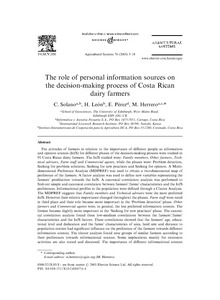Resource information
The attitudes of farmers in relation to the importance of different people as information and opinion sources (InfS) for different phases of the decision-making process were studied in 91 Costa Rican dairy farmers. The InfS studied were: Family members, Other farmers, Technical advisors, Farm staff and Commercial agents, while the phases were: Problem detection, Seeking for problem solutions, Seeking for new practices and Seeking for opinion. A Multidimensional Preference Analysis (MDPREF) was used to obtain a two-dimensional map of preference of the farmers. A factor analysis was used to define new variables representing the farmers' predilection towards the InfS. A canonical correlation analysis was performed to find-out simple and canonical correlation between farmers'/farms' characteristics and the InfS preferences. Informational profiles in the population were defined through a Cluster Analysis. The MDPREF suggests that Family members and Technical advisors were the most preferred InfS. However their relative importance changed throughout the phases. Farm staff were rated in third place and their role became more important in the ‘Problem detection’ phase. Other farmers and Commercial agents were, in general, the less preferred information sources. The former became slightly more important in the ‘Seeking for new practices’ phase. The canonical correlation analysis found three low-medium correlations between the farmers'/farms' characteristics and the InfS factors. These correlations showed that the farmers' age, educational level and dedication and the farms' characteristics of area, herd size and distance to population centres had significant influence on the preference of the farmers towards different information sources. The cluster analysis found nine groups of similar farmers according to their preferences towards informational sources. Some implications mainly for extension activities are also stated and discussed. The importance of different informational sources slightly change throughout the decision-making steps, the family and farm staff being the most preferred information sources.


